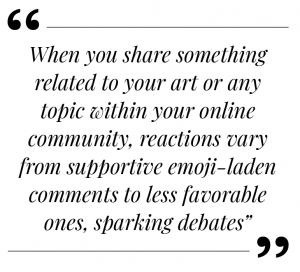
This exchange of thoughts extends beyond personal conversations to our social media platforms. When you share something related to your art or any topic within your online community, reactions vary from supportive emoji-laden comments to less favorable ones, sparking debates. It’s the nature of the digital world – posting invites reactions, whether positive or negative. It’s essential to be conscious of the potential repercussions.
Before posting on social media, especially about art, it’s crucial to gather facts and knowledge. People hold varying ideas and may engage in lengthy debates, driven by sentimentality. If you’re unprepared for such interactions, even within your digital space, it can lead to a frustrating day explaining yourself to people you’d rather avoid. In the realm of “artguments,” nobody truly wins, and ignoring antagonists might be the wisest choice. After all, why concern yourself with those who wouldn’t even consider purchasing your work?
In my case, every social media post undergoes meticulous consideration. After ensuring I possess the necessary facts and convincing myself of my ability to defend my viewpoint, I hit the post button. The response varies from numerous likes to engaging arguments. I welcome these debates as they stimulate my thinking. However, there are instances when I opt to disengage, recognizing the lack of productivity in continuing the conversation.
It’s become increasingly rare for individuals to concede when they are proven wrong, often due to pride – a phenomenon aptly labeled as bigotry. Such inflexibility inhibits personal growth, similar to a being with a swollen head and short extremities. Occasionally, humility is required to acknowledge when someone else is right, a trait often overlooked in a society where many insist on being absolutely right despite knowing otherwise.
